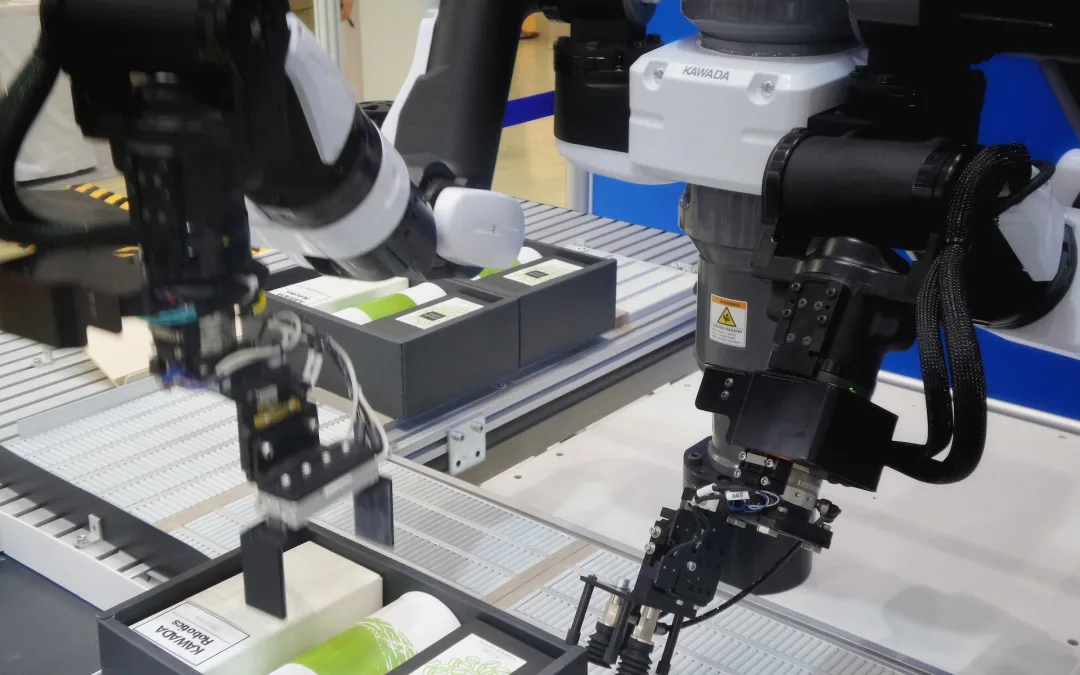If you’re interested in automation technology, you are probably familiar with many of the flagship RPA benefits already. You may have even read a few industry-specific case studies that demonstrate the transformative powers of automating your business processes.
Understanding the more popular benefits of RPA is an excellent starting point. However, the technology is capable of far more than just reducing labor costs, increasing production, eliminating human error, and enabling software test automation. While these are undoubtedly compelling reasons to adopt RPA solutions, they only scratch the surface of the technology’s potential within modern business environments.
To truly uncover the possibilities of this game-changing tech, we need to go beyond the standard benefits and unearth some of the less well-known Robotic Process Automation benefits.
10 less well-known RPA
(robotic process automation) benefits
RPA is highly adaptable. It is designed to work across almost any industry to deliver bespoke solutions for several business processes. However, there are several advantages of process automation that fly under the radar. In this article, we’ll highlight some of the less-talked-about but key benefits of RPA so you can evaluate this tech for what it truly is.
Here are some benefits of RPA automation for startups, small to medium-sized businesses, and large enterprises.
#1. Reduced risk of cybersecurity vulnerabilities
Cybercrime costs the world economy trillions of dollars each year. In 2023, these figures stand at around $8trn, but it’s forecasted to rise to a mammoth $14trn by 2028. Indeed, it’s such a serious issue that the World Economic Forum’s Global Risk Report suggested that cybercrime is in the top 10 of both current and future economic risks.
As reported by McKinsey, cybersecurity attacks are becoming more sophisticated and creative by the day. While this rapid evolution is matched by the next generation of cybersecurity tools, there is one glaring vulnerability that is almost impossible to fix: human nature!
As any cybersecurity expert knows, humans pose the weakest link in your cybersecurity operation. Whether it be malicious actors or a genuine mistake, about 88% of cybercrime occurs because of human error, according to a collaboration between cyber security firm Tessian and Stanford University professor Jeff Hancock.
There are many significant cybersecurity benefits of using RPA automation, such as network monitoring, application security, and disaster recovery. However, removing or reducing human activities can eliminate one of the most persistent cybersecurity leaks.
Another one of the security benefits of process automation involves GDPR and data security. Any business that has customers in Europe must comply with these guidelines. RPA allows organizations to adopt a privacy-first approach to data by automating data entry, retrieval, processing, and more, but without the need for human intervention.
#2. Improved talent acquisition
Finding top talent is still a big problem for many businesses, especially in the technology sector. Competition for the best new workers is fierce, and governmental attempts to resolve the STEM shortage have yet to bear fruit.
Adopting RPA tools means that you can boost employee satisfaction. RPA technology is designed to take over repetitive and menial tasks. When you have these processes locked down, your staff is free to do more creative or value-driven work.
However, there are downstream RPA advantages that go overlooked by many organizations. The world has never been more connected. Employees use various websites, like Glassdoor, to rate their experiences with specific organizations. A company that takes employee satisfaction seriously (by giving workers access to labor-saving tech) can expect positive reviews and employee referrals.
There are a lot of factors that employees take into account when they are deciding to accept or reject an offer. Work-life balance and employee satisfaction are high on the list, but many tech workers want to engage with cutting-edge tools and learn new skills.
Taking a forward-thinking approach to the future of work improves the perception of your company and adds to your Employer Value Proposition (EVP). In other words, RPA benefits for employees can turn into a way to attract the next generation of top talent.
#3. Business continuity
The last few years have underlined the importance of having a strong business continuity plan. COVID-19 caught many businesses by surprise and left them cobbling together with communication technology and cloud-based systems that could facilitate remote work. Recently, conflicts in both Ukraine and the Middle East have shown the fragility of daily operations.
RPA can help with business continuity in several ways. For starters, it can automate tasks like data transfer, backup, and other business-critical tasks. When the chips are down and employees can’t reach their desks, the benefits of using RPA automation become apparent.
A KMG-authored case study demonstrates the business continuity power of RPA. The paper describes how a leading equipment financial leasing company in China navigated stay-at-home orders by implementing RPA.
Before COVID-19 struck, they filed VAT returns manually for 70 different locations. It was a huge volume of work and an inefficient use of employee time. What’s more, manual input and filing were subject to human error. Implementing RPA into their workflow turned the process from an 8-hour job to a 1-hour job by using Computer Vision Technology (CVT).
This example can tell us a lot of things. Firstly, there are many inefficiencies that RPA can reduce. Secondly, you can implement RPA quickly. Finally, with the right approach, RPA can deliver an instant return on investment (ROI).
From a business continuity perspective, quick implementation is one of the key advantages of RPA over other technologies. These capabilities are a source of comfort for the business community in an increasingly uncertain world.
#4. Improving sustainability
Dire predictions about the climate and the environment are never far from the newspaper front pages. While physical robots will undoubtedly form part of an effective response, resource use and allocation will be the domain of RPA bots supported by AI technology.
One of the most obvious environmental benefits of RPA is that it supports digital transformation. Moving away from pen and paper and towards digital documents means less pressure on trees and less waste that needs to be recycled. However, this is just the first step on the road towards a more sustainable future.
While a lot of businesses have made Environment, Social, and Governance (ESG) commitments, they haven’t always followed through with success. However, RPA tools can support a pivot towards greener practices.
RPA can facilitate smart resource management, leading to a more efficient use of water and electricity. These principles can also extend to the manufacturing floor by powering inventory management and reducing material waste. Another core area involves supply chain optimization, with more efficient and data-driven systems designed to reduce carbon emissions.
Finally, as we’ve seen over the last few years, RPA is instrumental in enabling remote work. While work-from-home is not everyone’s cup of tea, it cuts down on travel, which reduces carbon emissions. This NASA report demonstrated how carbon emissions dropped by 5% during the height of COVID lockdown restrictions.
If your business has made sustainability commitments that it’s struggling to keep, you can’t ignore these Robotic Process Automation advantages.
#5. Transform company culture
Employee attitudes towards work have changed considerably over the last few years. A Gallup poll from 2022 on what employees want shines a light on these shifting priorities. While a good salary is always important, employees have expressed an interest in the overall package and, in particular, what benefits they can acquire. Once more, work-life balance is at the top of the agenda for modern workers.
However, another big priority for workers in the Gallup poll was the desire to “do what they do best.” In addition, a Gartner article from this year looked at how most employees want to derive more personal value from their work, with a desire for more autonomy cited as a key desire.
RPA delivers efficiency in the workplace by automating mundane and predictable tasks. The impact of mechanizing these jobs goes far beyond achieving ROI and reducing human error. When organizations embrace RPA, they free their employees to pursue more creative and value-driven tasks that are better suited to human intelligence. Research shows that the increase in employee satisfaction is significant. Indeed, a Forbes Insight study suggests that 92% of companies saw job satisfaction increase after implementing an RPA solution.
Adopting new technologies also has a significant benefit on company culture. We touched upon how RPA can help with talent acquisition in an earlier point. Investing in new technology is a statement of your company’s forward-thinking nature. When your workers feel your commitment towards innovation, it can breed a culture of openness and calculated and brave risk-taking.
#6. Improved third-party relationships
Strong vendor relationships are a marker of a healthy business. As business service outsourcing becomes commonplace and supply chains have grown more complex, companies are under pressure to balance cost savings and access to domain expertise against third-party risk.
There are many benefits of process automation for dealing with third-party businesses. For starters, RPA can read invoices and process payments, meaning your third-party vendors and suppliers get paid on time. Timely payments foster better relations and can help secure lower prices.
RPA can also help mitigate third-party risk by helping with due diligence. By automating background checks and document processing, you can streamline your risk management workflow and feel confident in your vendor selection.
Additionally, as outlined in Robotic Process Automation in Purchasing and Supply Management (Flechsig, 2021), RPA helps with purchasing and supply chain management (PSM) by automating large swathes of the procurement department’s tasks.
Other RPA advantages include the automatic update of third-party vendor and supplier details, automated communication, and better third-party performance monitoring.
#7. A pathway toward unlocking the benefits of Generative AI
As the dust settles on the explosion in popularity of Generative AI, some organizations are asking questions about the technology. In particular, Gartner has suggested that Generative AI has reached “the peak of inflated expectations” in a recent podcast and claimed that the technology was “overhyped” in a recent research paper.
Now, while these statements are certainly headline-making, it’s important to understand the context. Gartner believes the tech will make a big impact over the next two to ten years. However, they feel that it can’t live up to the potential of the hype because it is so out of control. However, as anyone who is familiar with the Gartner Hype Cycle, this is a normal process for an emerging technology.
Once the online buzz around Generative AI dies down, it will need to deliver on its undoubted promise. Some people and businesses will lose interest during this Trough of Disillusionment as revenue-generating use cases prove elusive.
But Generative AI isn’t blockchain, NFTs, or web3. It has clear use cases that can deliver tangible value. Open AI didn’t really need a huge marketing campaign to launch its product. If anything, the marketing had more in common with a product-led growth campaign than, for example, NFT marketers paying Tom Brady or Justin Bieber considerable sums to promote their products.
Generative AI, when used in concert with RPA, can help users find commercially viable use cases for this new and exciting technology. RPA can provide the framework for connecting with Generative AI tools via APIs and help the tech make a difference in the business world.
What’s more, for all the obvious RPA automation benefits, it struggles with certain tasks, like dealing with unstructured data. Alongside Computer Vision Technology (CVT), Generative AI can help businesses understand and process complex, unstructured data of many kinds and open up many promising avenues.
#8. Social impact of more efficient government bodies
Governments across the globe are struggling to deliver core services for their citizens. While many people figured we’d seen the end of post-financial crisis austerity-era politics, it turns out we were wrong. After global governments sunk trillions into vital COVID-19 support packages, they will try to claw this money back in the next few years.
There is clear pressure on governments and public sectors to deliver value for money, especially in these straitened times. However, this is a perfect task for RPA. The public sector, just like the private sector, is full of inefficient and time-consuming business processes. Of course, a poorly run private sector typically doesn’t go out of business, so it’s fair to say there is more latitude for inefficiency and bureaucratic bloat.
Many government organizations run on outdated back-end systems. These tools can be dragged into 2023 by integrating with RPA, boosting their capabilities, and saving taxpayers from funding expensive overhauls. What’s more, citizen services can leverage RPA to help with onboarding and documentation processing, assisting people to get the support they need.
Police services are another government body that has been hit hard by funding cuts over the last few decades. In the UK, the budget cuts have been particularly harsh, leading to increasing public dissatisfaction. A Deloitte case study outlined some ways RPA could improve police service, including “automation of traffic offenses, updating alcohol licenses, completing character enquiries, supporting crime reporting, auditing intelligence systems, and supporting the fight against cyber-crime.”
Similarly, a Gartner article from last year outlines how governments can adopt RPA to improve and streamline existing processes.
If government bodies can automate more tasks, they can rotate public funds away from administration and toward vital causes. Who wouldn’t want their tax money to go towards essential services?
#9. Driving entrepreneurship
Entrepreneurship comes in all shapes and sizes, from bootstrapped startups to VC-funded scaleups. Having access to a digital workforce is one of the most significant Robotic Process Automation advantages. When founders have a great idea they want to get off the ground, they encounter many bottlenecks. Finding funds and employees are two of the most common.
There is no shortage of RPA applications for plucky entrepreneurs. The technology can be used to automate marketing, manage customer interactions, or mechanize finance and accounts. However, these tools can also provide the building blocks of a lean business. Launching a startup can be a rocky road, and RPA offers founders a way to scale up or down with the ebbs and flows of business.
Automating repetitive tasks is just one of the direct business benefits of RPA. For founders, it also opens the doors to using time and resources more efficiently. Instead of pouring over financial or customer data, the entrepreneurs of tomorrow can outsource these tasks to machines and get on with problem-solving, innovation, and product development.
#10. Enhanced diversity and inclusion
Over the last few years, many organizations have made commitments to diversity, equity, and inclusion (DEI). However, the sincerity of these pledges is under scrutiny, with many employers and civil rights groups suggesting that once the PR has died down, little has changed within many of these organizations.
One big problem is that many organizations just don’t know how to implement a fairer workplace. However, RPA can provide a viable solution to many of the common issues. For example, if hiring bias is a problem within an organization, HR teams can automate resume sifting to reduce the effect of discrimination.
The paper, Using AI to minimise bias in an employee performance review (Melton, 2022), suggests that natural language processing (NLP) and conversational AI (CAI) could be used at various phases of candidate sifting and employee performance evaluation to ensure equality in hiring and promotions. But the RPA benefits for business leaders with an interest in DEI don’t stop there.
Perhaps the most interesting use of RPA is found in its ability to support people living with disabilities and the neurodivergent. While traditional workplaces have excluded many of these individuals, they remain a pool of untapped talent that companies can use to drive growth. RPA’s ability to automate various tasks can make a big difference for this section of the community by supporting them with jobs they find difficult.
For people living with disabilities, Attending RPA tools could do lots of the day-to-day human-computer tasks, allowing them to focus their minds on thinking. In effect, RPA could act as an assistant to support these individuals thanks to its flexibility to adapt to a wide range of tasks.
Final thoughts
There are many well-known RPA benefits that get a lot of press. Reducing operating costs, freeing up workers, and improving throughput are desirable advantages because of their positive impact on the bottom line.
However, there are several Robotic Process Automation benefits that are just as important but a lot less visible. As our list of less conventional benefits of RPA automation shows, the technology is a vital tool for modern enterprises and organizations in a number of exciting ways. From reducing cybercrime and driving innovation and entrepreneurship to improving diversity and helping meet ESG targets, RPA can do it all.
There are so many benefits of using RPA that go overlooked. At ZAPTEST, we understand the impact that our technology can have on your organization goes beyond just making your business quicker and more productive. So before you run a Robotic Process Automation cost-benefit analysis, ensure that you factor in some of these less well-known but valuable benefits.




